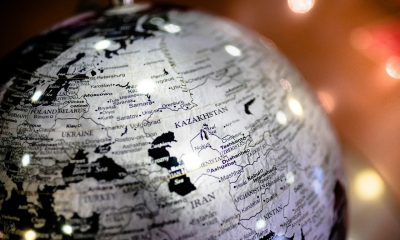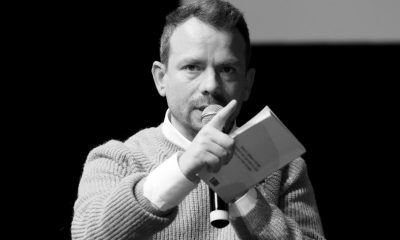ailse
Tá an comhrac in aghaidh ailse ar siúl i gcónaí: #WorldCancerDay agus saincheisteanna cúraim sláinte níos leithne an AE

 Most of us know, have known, or will know someone with cancer. It is perhaps the most singular threat to health care on a worldwide scale, despite all the incredible leaps lately in diagnosis and treatment, scríobhann Chomhghuaillíocht Eorpach do Pearsanta Leigheas (EAPM) Stiúrthóir Feidhmiúcháin Denis Horgan.
Most of us know, have known, or will know someone with cancer. It is perhaps the most singular threat to health care on a worldwide scale, despite all the incredible leaps lately in diagnosis and treatment, scríobhann Chomhghuaillíocht Eorpach do Pearsanta Leigheas (EAPM) Stiúrthóir Feidhmiúcháin Denis Horgan.
Now the annually held Lá Ailse Domhanda (4 February) is upon us, and amárach will see global events under the current three-year theme I Am And I Will.
An lá serves to recognize go commitment by all those able to act will lead to powerful progress in reducing the global impact of cancer, and all actions - big and small - can make lasting, positive athrú.
World Cancer Day and ongoing campaigns are built to resonate, inspire change and mobilize action long after the day has passed, and the organizers believe, as does EAPM that a multi-year campaign offers a chance to create long-lasting impact by increasing public-facing exposure and engagement, more opportunities to build global awareness and impact-driven action.
2020 marks the midway point den mhéid thuasluaite tríbliain 'I Am and I Will' campaign, which represents an empowering call-to-action urging personal commitment and represents the power of action taken now to have a positive tionchar on an todhchaí.
Tionscnaimh Eorpacha
This year is an especially important one in the sphere of cancer for EU citizens, given the Ursula von der Leyen Commission’s Beating Cancer Plan, which the European Alliance for Personalised Medicine supports wholeheartedly.
Go bunúsach, an An Coimisiún Eorpach Gheall to make the battle against cancer in Europe a key priority of the legislative term.
EAPM is also playing its part, not least in the form of three upcoming Presidency conferences which will help to underline an gá le práinneach gníomhaíochta.
All politicians and stakeholders working in health care know how high citizens place health and health care on the day-to-day agenda, but we need concrete actions right now to go with the well-meaning talk and pledges for the future.
Patients need gníomh, saoránachs need it and, put bluntly in this ‘cash is king’ world, the economy needs é.
I measc na heochrach ceists in healthcare in general and cancer in particular is ea a dhéanaimid bring innovation into health-care systems so that we can have earlier diagnosis and a better quality of life for citizens?
EAPM and its stakeholders and partners know that and also that we need better use of health data, a well-trained lucht oibre up to date with new methods, and an educated citizenry that understands (and as a result takes at least some responsibility for) its own Sláinte riachtanais.
On top of this, and where EAPM is especially effective, we need a progressive, workable and sustainable creat rialachais which, among other key elements, takes into account genomics, data and access to high quality testing. In this personalised medicine world, we need to know which disease a patient has as well as an individual’s predisposition to a galar for preventative purposes.
Getting this right will ensure better healthcare for citizens and go a long way to upholding the EU’s aims of a high-quality slí bheatha.
Eduine has a role to play via a multistakeholder approach, much-championed by EAPM and its colleagues.
The Alliance has fully supported the proposal for Cancer Missions, has worked hard to promote lung-cancer and prostate screening and, le déanaí, has put its weight behind the MEGA+ initiative that aims to increase the exchange of all valuable health-related data.
Alongside all this, the underlying goal has been to put, and keep, the person in personalised healthcare.
All stakeholders, member state-governments, communities, employers and media have a role to play to challenge perceptions about cancer to create a culture and a population where people living with the disease do not face discrimination in the workplace, in the health system or in our society.
Meanwhile, access to the best treatment available for all citizens is one of the tenets of personalised medicine, and making this happen is a moral imperative supported by all of us at EAPM and every stakeholder in this arena.
(To view our current programme of our March 24th Conference on Personalised Medicine, please Cliceáil anseo and to register your attendance, please cliceáil anseo.)
Drawing the battle lines
So while we have used this opportunity to highlight World Cancer Day, the fight must go on during every one of the other 364 days of every single year.
Because, make no mistake, it is a fight. A true battle often against ridiculous odds. For example, in the now-departed UK, research has shown that cancer medicines are taking longer to get to patients in the NHS. The timeline from patent priority to patient availability increased from 12.8 years to 14 years between 2009-2016.
Meanwhile, in certain cancer areas, no new drugs Tá being licensed for use. This is an unacceptable situation, anywhere, in the third decade of the 21st century.
Moving forward - EU values and ‘way of life’
The Commission’s just-released work programme sets out the most important initiatives the EU Executive intends to take in its first year, and will act as a foundation for actions.
It is focused around the six headline ambitions set out in President von der Leyen's Political Guidelines, agus also reflects the main priorities for the European Parliament and those in the European Council's Strategic Agenda for 2019-2024.
As the Commission puts it: “The European way of life is built around our values of solidarity, equality and fairness. It is about feeling safe, secure and having peace of mind, supporting the most vulnerable in our society and championing inclusion.
"It is about finding common solutions to shared challenges and equipping people with the skills they need, and investing in their health and wellbeing. It is about building stronger, more cohesive and more resilient European societies."
An Work Programme acknowledges also that the EU “has an important role in helping Europeans take care of their health. We want Europe to take the lead in the fight against cancer".
It explains that the Commission will put forward Europe's Beating Cancer Plan to support member states in their efforts to improve cancer prevention and care. The Commission will also launch a Pharmaceutical Strategy for Europe to continue ensuring the quality and safety of medicines and consolidating the sector’s global competitiveness.
Europe should also make sure that all patients can benefit from innovation while resisting the pressure of increasing costs of medicines, the programme states, while focusing also on education.
Ag breathnú chun cinn, don Choimisiún a deir sé will present a Report on the Impact of Demographic Change, Rud a will look at how new demographic realities affect everything from social and regional policy, health, finance, digital connectivity, skills and integration.
The Commission will also propose a long-term vision for rural areas and a Green Paper on Ageing, a key issue in modern-day health care.
And so, farewell, then…
Health and many other issues know no borders, and the UK’s departure from the EU late last Friday marks the beginning of mhí de diana negotiations over the ríthábhachtach future relationship, set against yet another deadline - this one 31 December, after which UK Prime Minister Boris Johnson says there will be no more talks.
Dpléisiúir will certainly start and without doubt intensify on trade, immigration and financial services, comh maith le on medicines and health care.
The coronavirus that has emerged from China and is spreading globally has already shown that research partnerships between the EU and Britain need a bheith kept working well.
Ar bharr seo, the Association of European Cancer Leagues has sent out litir go dtí an Eoraip's health ministers, their health ag gabháilés and the EU's negotiating team to try to make sure that any future relationship Bhuaigh’t leave othair ailse taobh thiar de.
This means, among other elements, cross-border trials continuing, plus access to all necessary cancer drugs and medical devices being maintained. (The Athbhreithniú Cógaisíochta na hEorpa says that almost 90% of UK pharmacists are concerned about the supply of medicines after Brexit.)
Idir an dá linn, the European Medical Organisations have also called on EU-UK negotiators to "do whatever is necessary" to ensure that the European medical profession can "continue to treat its patients to the highest possible level beyond the end of the transition period”. Not just in cancer, but across the healthcare spectrum.
There’s much to be done, but the Commission is certainly striving to make inroads. And you can be assured that EAPM will remain in the vanguard as we move forward in our bid to put people at the centre of modern medicine and deliver the access to the care that they need, deserve and have been promised.
(To view our current programme of our March 24th Conference on Personalised Medicine, please Cliceáil anseo and to register your attendance, please cliceáil anseo.)
Comhroinn an t-alt seo:
-

 an bhanglaidéisLá ó shin 5
an bhanglaidéisLá ó shin 5Tá Aire Gnóthaí Eachtracha na Bhanglaidéis i gceannas ar cheiliúradh Saoirse agus Lá Náisiúnta sa Bhruiséil in éineacht le náisiúnaigh Bhanglaidéis agus cairde eachtrannacha
-

 CoinbhleachtaíLá ó shin 3
CoinbhleachtaíLá ó shin 3Céimeanna an Chasacstáin i: Idirscaradh na hAirméine-Asarbaiseáin
-

 RómáinLá ó shin 5
RómáinLá ó shin 5Ó dhílleachtlann Ceausescu go dtí oifig phoiblí – tá iar-dhílleacht anois ag iarraidh a bheith ina mhéara ar commune i nDeisceart na Rómáine.
-

 chasacstáinLá ó shin 4
chasacstáinLá ó shin 4Oibrithe Deonacha Aimsíonn Peitroglyphs ón gCré-umhaois sa Chasacstáin le linn Feachtais Timpeallachta






















